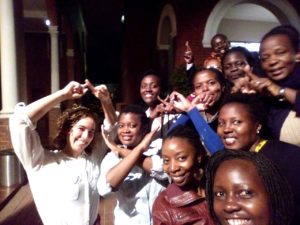A blog by Chenai Chair.
My first encounter with internet governance forums was in 2015 through the first Africa gigX held parallel to the African School of Internet Governance in Addis Ababa. This was hosted by APC’s women’s rights unit. Running some of the gigX sessions alongside AfriSIG sessions meant that preaching was being done to the converted, to women’s and sexual minority rights activists who already placed value on critically engaging with gender issues in the internet space. However, the space for gigX provided me with a critical lens to approaching gender and internet issues in the realm of internet governance.
What is gigX?
The gigX initiative is part of APC’s End violence: Women’s rights and safety online project. This project was formed after identifying a gap in the internet policy processes: there was a lack of participation from women’s rights and sexual rights advocates. This has hindered development of wholesome national, regional and global policies, in every sector and stakeholder group.
To address this issue, APC opted to develop and strengthen “processes and mechanisms that enable the active, equal and meaningful participation of women and girls in decision-making on how the internet is shaped and prioritized.” This would only be possible if women, girls and the LGBTIQ community were able to meaningfully engage all other stakeholders on the way the internet is developed and managed. The evolving principles of a feminist internet provides a guide on the kind of internet that every feminist can and does imagine; guidelines that can be applied to policies and regulatory approaches to internet governance.
Fast forward to 2016,
I assisted in facilitating the second gigX meeting between Uganda and South Africa hosted by Wougnet and Women’sNet. My focus was unpacking internet governance and the need for critical engagement from a gendered perspective, particularly using the feminist principles of the internet. This was crucial given that this year’s gigX participants were part of this year’s AfriSIG, giving them an opportunity to actually apply APC’s vision when they formed the program. By having gigX participants in AfriSIG, women’s rights issues were shared with everyone to understand why there is need for focused understanding within the internet governance space.
Reflecting on my personal experience, while issues pertaining to ensuring an open internet for all are the focus, the internet governance space is constantly marked with ‘manels’ (all male panels), the silenced women in the room, queries on why women’s issues should be given priority over others or women only on gender related topics. It never ceases to amaze me that five women can be found on a gender inclusivity panel whilst there is only one woman on a digital economy panel. Meaningful participation, not just token representation, of women and girls in this space is still limited, but the progress is noted.
I hope that by participating and interacting with gigX participants, this year’s AfriSIGers learnt a focused approach to internet governance; pushing them all to consider whether the multi stakeholder bottom up, transparent and inclusive approach meaningfully engages with gender issues.
